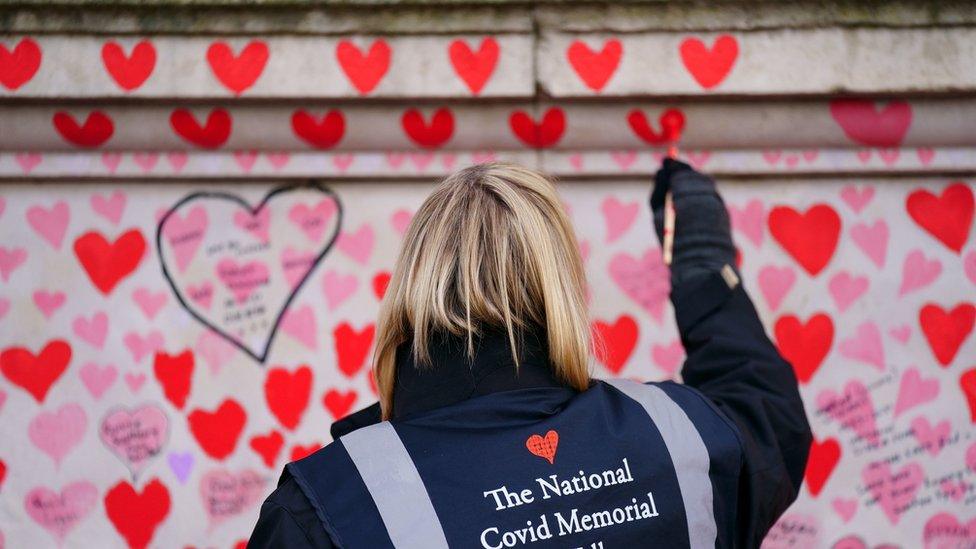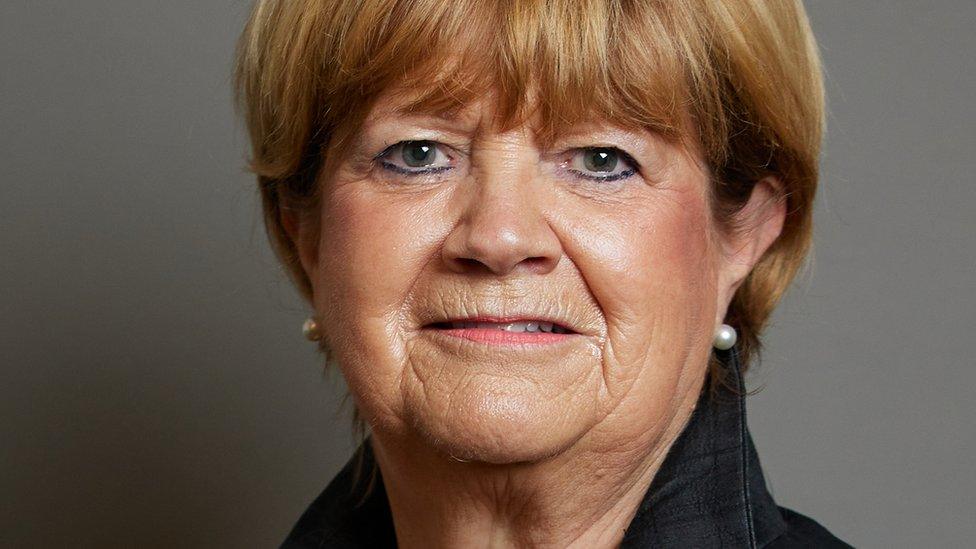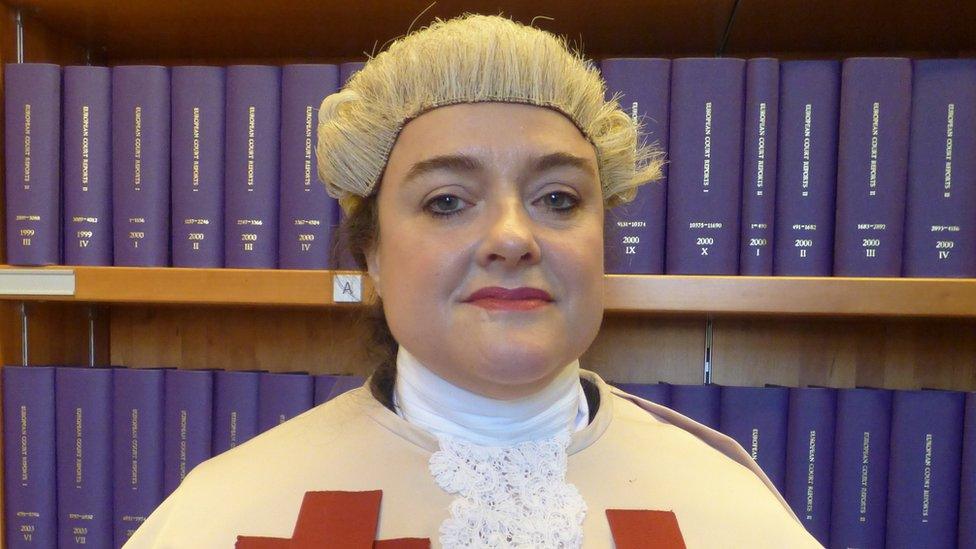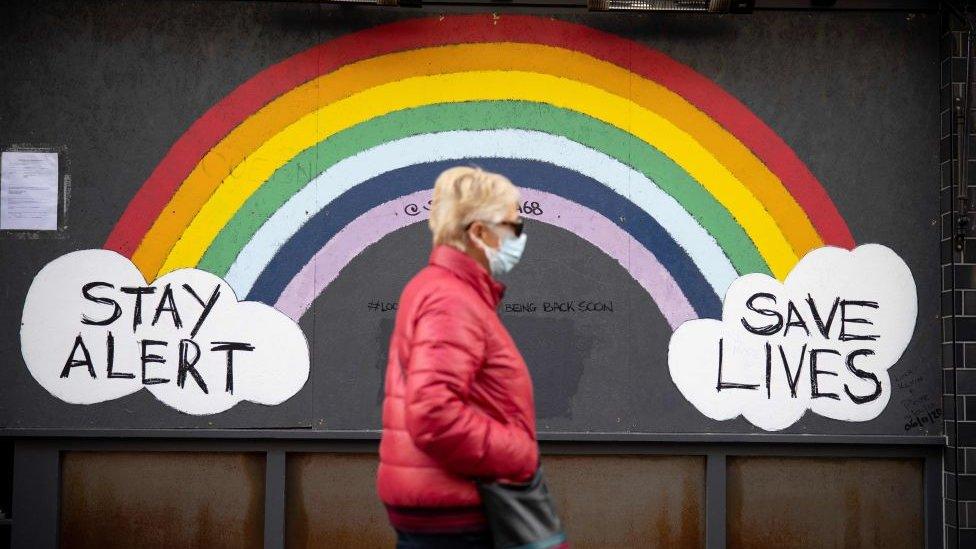Covid inquiry: Lessons will be learned before next pandemic
- Published
- comments

A volunteer from the Covid-19 Bereaved Families for Justice campaign group paints a heart on the National Covid Memorial Wall opposite the Palace of Westminster, in central London
Lessons will be learned about the UK's handling of Covid, before another pandemic strikes, Baroness Hallett, chairing the public inquiry, has said.
Opening the inquiry, she promised to be "fair and robust".
The former High Court judge said she would conduct the inquiry as quickly as possible, without giving a timeframe for its completion.
Those who had suffered the most deserved to know if more could have been done, she said.
Lives had been lost, education harmed, businesses folded and mental and physical health had suffered.
"Every person has had their life changed to some extent," Lady Hallett said.
"Those who have suffered the most will want to know if any more could have been done to reduce their suffering."
The inquiry can compel witnesses to give evidence and release documents, but cannot prosecute or fine anyone.
It was a substantial task that would take time and have a significant cost, Lady Hallett said.
But she added: "I am determined to undertake the inquiry as speedily as possible so lessons can be learned before another pandemic strikes."
Public hearings will begin in the spring.
Before then, Lady Hallettt said, the key topics for the inquiry would include:
how well prepared the UK had been
the response when the pandemic it hit
the decision to introduce a lockdown and other restrictions on the public - and the scientific expertise informing it
The inquiry will begin taking evidence from experts in September.


There will be many involved in the care sector who will have a great deal to say. They will remember the early warnings from other countries about the vulnerability of care homes.
Care providers will recount their struggle to get protective equipment; what they saw as the slowness of government guidance; the rapid discharge of hospital patients into care homes, some taking with them the virus and above all, their sense of being forgotten.
Families who were unable to see or in too many cases, say goodbye to their loved ones, are likely to have their say later in the inquiry.
But in weighing up our preparedness for the pandemic, there is one number that perhaps tells the most powerful story. In the first wave between March and June 2020, nearly 20,000 care home residents died of Covid in England and Wales. At that time, it represented more than a third of the total number of deaths.

Jo Goodman, co-founder of Covid-19 Bereaved Families for Justice campaign, said: "Today was an emotional day for those of us who have lost loved ones and it meant a lot to hear Baroness Hallet recognise the devastating nature of bereavement and the pain we've been through.
"Ultimately, all bereaved families want the same thing, which is to make sure that lessons are learnt from our devastating losses to protect others in the future."
Charles Persinger, who is part of the campaign and lost his mother and wife to Covid, added: "We've waited a long time to get to this point - we would have liked the inquiry to start sooner. But what is important now is to really get to the bottom of the mistakes that were made."
Several reports have already put the UK government's handling of the pandemic under the spotlight.
Last October, a report by MPs on the Health and Social Care Committee and the Science and Technology Committee said the UK's failure to do more to stop Covid spreading early in the pandemic was one of the country's worst public-health failures.
And a report by spending watchdog the National Audit Office last November found ministers had not been properly prepared for a pandemic such as Covid, and lacked detailed plans on shielding, job-support schemes and school disruption.
The Scottish government has launched its own Covid inquiry, led by judge Lady Poole.

The Covid pandemic had a devastating impact on ethnic minority communities in the UK.
In the first wave of the pandemic, black people were almost four times as likely to die of Covid than white people, while Asians were twice as likely to die. About 95% of doctors who died of Covid were ethnic minorities.
Saleyha Ahsan, a doctor and documentary maker, lost her dad to Covid-19. She tells me it's good inequalities are being considered, but she's "keen to see how [Baroness Hallett] does it in real terms".
"I'm not convinced it's going to cover it all, so I am wary."
Dr Ahsan is involved with the Covid-19 Bereaved Families for Justice, which led the campaign for an inquiry to happen.
"The main thing is is that we have now crossed the start line," she says. "We've been calling for this for a while… and today is a definite firing of the starting gun."
Related topics
- Published15 December 2021

- Published14 December 2021

